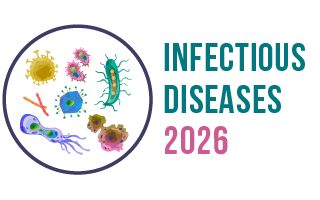4th International Conference on
Infectious Diseases
September 09-10, 2026 | Barcelona, Spain

Address: Avinguda Del Maresme 78 Ronda De Dalt Exit 15, 08940 Comella de Llobregat, Barcelona, Spain
Infectious Diseases 2026

Shanghai Jiao Tong University, China
Title : Impact of Climate Change on Inflammatory variables and Mental Health with a focus on Allergies
Abstract:
Climate change is a significant global challenge with far-reaching implications, including its effects on health. This study examines the intricate relationship between climate change, inflammatory variables, mental health, and allergies. As temperatures rise and weather patterns shift, there is a growing concern regarding the impact of these changes on human health.
The rise in global temperatures is linked to an increase in the prevalence and severity of allergies, triggering immune responses that can lead to heightened inflammation in the body. These inflammatory variables not only pose a threat to physical health but also have profound implications for mental well-being. Individuals experiencing allergic reactions may be more susceptible to mental health disorders, such as anxiety and depression, due to the chronic stress of managing their condition.
Understanding the complex interplay between climate change, inflammatory responses, allergies, and mental health is crucial for developing effective strategies to mitigate the adverse effects on individuals and communities. By identifying these connections, healthcare professionals can better tailor interventions to address both the physical and psychological impacts of climate change-related health challenges.
This research sheds light on the urgent need for multidisciplinary approaches that consider the intertwined nature of environmental, physical, and mental health factors in the face of a changing climate.
Biography:
Kadir Uludag holds Ph.D. in Applied psychology (Chinese Academy of Sciences). He is currently doing postdoc in Shanghai Jiaotong University Mental Health Center. His research interest includes schizophrenia research, drug addiction and educational psychology. In addition, he runs a website to share and comment on peer-reviewed articles (ifx0.com).
